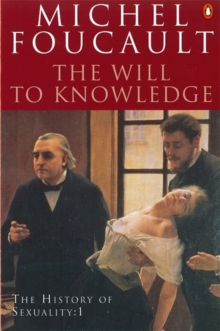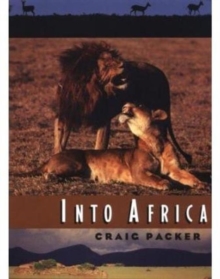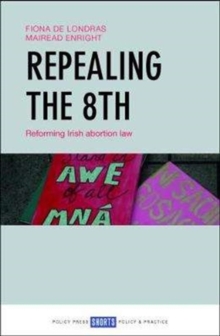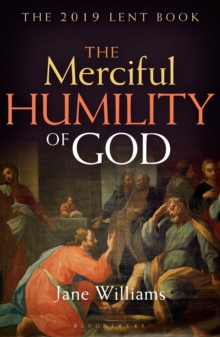Another good reading month this month:

When I was doing my PhD, I bought all 3 volumes of Michel Foucault’s A History of Sexuality. I only managed to read the first volume, The Will to Knowledge, at the time. I found it really fascinating and helpful, and I always intended to get back to them just for interest and learning’s sake. So I’ve started by re-reading Vol 1. Clearly in the 10+ years since I did my PhD, my intellectual capacity must have atrophied because I found quite a large chunk of this book pretty incomprehensible, and I ended up skimming quite a lot of it. The bits I’d highlighted still made sense, and there were a few other parts where I thought that the ideas were really interesting, but I’m really not sure I can muster up much enthusiasm for the other 2 volumes. The book considers Foucault’s usual themes (knowledge, power, discourse) and was pretty groundbreaking at the time, influencing many (frankly much more readable) scholars working on sexuality. I may give Vol 2 a try at some point, but suspect though that I’ll be giving these away to someone who’ll appreciate them more. 3/5.

This month’s library book was Henry David Thoreau’s Walden; and, on the duty of civil disobedience. Written in the mid-19th century, Walden is the account of the author’s building a shack and living on the land by Walden Pond near Concord, Massachusetts. It’s considered a classic of nature writing, and an American classic (one of my American friends told me that, at least when she was growing up and at school, everyone had to read it in high school). This particular copy also includes his later essay On the Duty of Civil Disobedience. Walden is a series of essays about the place, and I had high hopes!
Unfortunately, I found it pretty hard-going! I am coming to the conclusion that for the most part I’m really not suited to pre-20th century writing. I found this book verbose and a bit overblown, but most disappointingly for me, for the bulk of the book what I was wanting to know about – the nature and the place – were largely subsumed in Thoreau’s writing about himself and his deep thoughts. A couple of the essays, specifically about the pond itself, were sublime (extra half star for them), and most of the others had bits of nature writing if you dug hard enough, but I found myself skimming more of this than I like to do in a book. 3/5.

Into Africa by Craig Packer is an account of a fieldwork trip in the early 1990s to the Serengeti and Gombe national parks in Tanzania. Packer is an academic who has worked on lion studies in the Serengeti since the 1970s, also working with Jane Goodall on chimp/baboon studies in Gombe. During this trip he is initiating some new field assistants who will be collecting data in the field, and helping a PhD student collect samples. This is written as a daily diary, but he also reflects on the things he has learnt about the animals and the place over the decades, and his past experiences as well as what happens during this field trip. It was very readable, not dusty and academic at all, and gave a great sense of the excitement and mundanity of the work, as well as the challenges of the setting. I really enjoyed it. 4/5.

I received this book from the publishers as part of the LibraryThing Early Reviewers programme; thank you to the publishers and author for this opportunity.
Postcards from the Borderlands sees the author David H. Mould in several countries which have disputed, precarious, or otherwise not necessarily logical borders. He travels extensively, usually working as a consultant, and seeks out the more authentic experience of the countries than the average tourist would usually experience. I enjoyed reading this very much, although his accounts of some countries and in particular their issues around borders were more interesting and obvious than others, and in most of the chapters there were aspects which felt a bit more basic ‘travel writing’ than analysis of the impact of borders. The final chapter, where he sums up the main issues (eg different perceptions of borders depending on nationality, ethnicity, religion, etc), was very interesting – I’d have liked to have seen a bit more of that sort of discussion threaded more overtly throughout the whole book. 3.5/5.

Danny Katch is an American comedian and activist, unashamedly politically left-wing. Despite the deliberate provocation of the cover image, Why Bad Governments Happen to Good People is not just “Trump is terrible” (although he does think that) – he’s equally critical of the Democrats (even Bernie Sanders doesn’t get 100% favourable coverage here!), and traces how mainstream politics and society going way back led to where politics is today. Having read this a few years after it was published, it didn’t feel like there was much new as a lot of this has been hashed out in discussions and debates over the past 4 years. But as an outsider looking in at American politics, what was new to me was the sheer extent of wasted opportunities and general incompetence. It was a very readable account, and as someone who basically agrees with him I enjoyed this (if ‘enjoy’ is the right word for a book about so many missed opportunities and terrible politics). If you want an unbiased account of American politics then this won’t be the book for you, but as a short introduction to the major issues and players then it’s well worth a look. 3.5/5.

Repealing the 8th: Reforming Irish Abortion Law by Fiona de Londras and Mairead Enright is a short book, originally published in 2017, the year before the referendum where the 8th Amendment to the Irish Constitution was repealed. This book does have an epilogue from after the referendum was announced, but before it took place – I’d be interested in a further update now that it’s been 3 more years further down the road. The two authors are law professors, and they look at the background to the 8th Amendment and related legislation regarding pregnancy and abortion, and propose an outline of new legislation based on their extensive discussions with interested parties. Law is not usually my field of interest, as it always seems so dry, but this book was interesting and it was really helpful to see how the legal situation was being analysed and proposals for future law being made. 4/5.

The Merciful Humility of God by Jane Williams is the book I’ve been reading for Lent this year. It is laid out in 5 chapters, which consist of an exposition of a relevant Biblical passage, an account of a saint or other holy person (eg St Francis of Assisi, St Teresa of Avila) whose life embodies the subject of the chapter, and some questions for discussion/contemplation. I think this would work better as a group read rather than an individual one – I’m probably a bit shallow, but I think I really prefer a more structured, day by day Lent read, and I’ll try to go back to that structure for my Lent book next year. 3.5/5.

Diane Ackerman’s Cultivating Delight: A Natural History of my Garden is a lovely book detailing a year in her clearly very extensive garden in New York state. She is an avid gardener, and describes the seasons and lives in the garden beautifully. Occasionally I felt a bit cynical, I’m sure if I had access to that sort of huge garden I could rhapsodise that much too, but I got over myself, because cynicism is just antithetical to such a delightful book. Lots of memorable accounts, although I think my favourite was the short chapter about the hospice garden she volunteers at, and the birdhouse competition they came up with to raise funds. Definitely recommended. 4.5/5.
